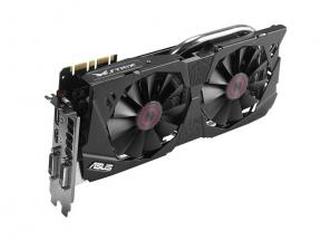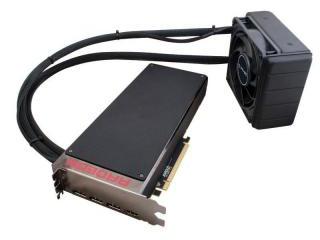GeForce GTX 970 vs Radeon Pro Duo
If you are going to buy a new graphics card and are choosing between GeForce GTX 970 and Radeon Pro Duo, there are a couple of things to consider. Cards with more VRAM in general perform better and allow you to play on higher graphics settings. Size also makes a difference. A model with a large heatsink can occupy up to three expansion slots on a motherboard. Be sure you have enough room in your PC case. When comparing GPUs with different architectures, more processing cores and even higher TFLOPS will not always translate to better performance. To help you decide which GPU you need, we have measured frame rates in a number of popular games. For more on how the GeForce GTX 970 stacks up against Radeon Pro Duo, check out specs charts below.
Main Specs
GeForce GTX 970
Radeon Pro Duo
Power consumption (TDP)
148 Watt
350 Watt
Interface
PCIe 3.0 x16
PCIe 3.0 x16
Supplementary power connectors
2x 6-pins
3x 8-pin
Memory type
GDDR5
High Bandwidth Memory (HBM)
Maximum RAM amount
4 GB
8 GB
Display Connectors
1x DVI, 1x HDMI, 3x DisplayPort
1x HDMI, 3x DisplayPort
Recommended system power (PSU)
500 Watt
Check Price
Check Price
Radeon Pro Duo has 136% more power consumption, than GeForce GTX 970.
Both video cards are using PCIe 3.0 x16 interface connection to a motherboard.
Radeon Pro Duo has 4 GB more memory, than GeForce GTX 970.
Both cards are used in Desktops.
GeForce GTX 970 is build with Maxwell architecture, and Radeon Pro Duo - with GCN 3.0.
GeForce GTX 970 and Radeon Pro Duo are manufactured by 28 nm process technology.
Radeon Pro Duo is 267 mm longer, than GeForce GTX 970.
Memory clock speed of Radeon Pro Duo is 493 MHz higher, than GeForce GTX 970.
Game benchmarks
Assassin's Creed Odyssey
Battlefield 5
Call of Duty: Warzone
Counter-Strike: Global Offensive
Cyberpunk 2077
Dota 2
Far Cry 5
Fortnite
Forza Horizon 4
Grand Theft Auto V
Metro Exodus
Minecraft
PLAYERUNKNOWN'S BATTLEGROUNDS
Red Dead Redemption 2
The Witcher 3: Wild Hunt
World of Tanks
high / 1080p
50−55
50−55
ultra / 1080p
30−35
30−35
QHD / 1440p
27−30
27−30
4K / 2160p
14−16
14−16
low / 720p
75−80
75−80
medium / 1080p
60−65
60−65
GeForce GTX 970 and Radeon Pro Duo have the same average FPS in Assassin's Creed Odyssey.
high / 1080p
75−80
75−80
ultra / 1080p
70−75
70−75
QHD / 1440p
50−55
50−55
4K / 2160p
27−30
27−30
low / 720p
130−140
130−140
medium / 1080p
85−90
85−90
GeForce GTX 970 and Radeon Pro Duo have the same average FPS in Battlefield 5.
low / 768p
45−50
45−50
QHD / 1440p
45−50
−
GeForce GTX 970 and Radeon Pro Duo have the same average FPS in Call of Duty: Warzone.
low / 768p
250−260
250−260
medium / 768p
230−240
230−240
QHD / 1440p
150−160
150−160
4K / 2160p
100−110
100−110
high / 768p
220−230
220−230
GeForce GTX 970 and Radeon Pro Duo have the same average FPS in Counter-Strike: Global Offensive.
low / 768p
70−75
70−75
medium / 1080p
50−55
50−55
GeForce GTX 970 and Radeon Pro Duo have the same average FPS in Cyberpunk 2077.
low / 768p
120−130
120−130
medium / 768p
110−120
110−120
ultra / 1080p
110−120
110−120
GeForce GTX 970 and Radeon Pro Duo have the same average FPS in Dota 2.
high / 1080p
60−65
60−65
ultra / 1080p
60−65
60−65
QHD / 1440p
40−45
40−45
4K / 2160p
21−24
21−24
low / 720p
100−110
100−110
medium / 1080p
65−70
65−70
GeForce GTX 970 and Radeon Pro Duo have the same average FPS in Far Cry 5.
high / 1080p
90−95
90−95
ultra / 1080p
70−75
70−75
QHD / 1440p
45−50
45−50
4K / 2160p
21−24
21−24
low / 720p
220−230
220−230
medium / 1080p
140−150
140−150
GeForce GTX 970 and Radeon Pro Duo have the same average FPS in Fortnite.
high / 1080p
85−90
85−90
ultra / 1080p
65−70
65−70
QHD / 1440p
45−50
45−50
4K / 2160p
30−35
30−35
low / 720p
130−140
130−140
medium / 1080p
90−95
90−95
GeForce GTX 970 and Radeon Pro Duo have the same average FPS in Forza Horizon 4.
low / 768p
160−170
160−170
medium / 768p
150−160
150−160
high / 1080p
95−100
95−100
ultra / 1080p
45−50
45−50
QHD / 1440p
40−45
40−45
GeForce GTX 970 and Radeon Pro Duo have the same average FPS in Grand Theft Auto V.
high / 1080p
35−40
35−40
ultra / 1080p
30−35
30−35
QHD / 1440p
24−27
24−27
4K / 2160p
14−16
14−16
low / 720p
95−100
95−100
medium / 1080p
50−55
50−55
GeForce GTX 970 and Radeon Pro Duo have the same average FPS in Metro Exodus.
low / 768p
120−130
120−130
GeForce GTX 970 and Radeon Pro Duo have the same average FPS in Minecraft.
high / 1080p
75−80
75−80
ultra / 1080p
55−60
55−60
4K / 2160p
18−20
18−20
low / 720p
120−130
120−130
medium / 1080p
85−90
85−90
GeForce GTX 970 and Radeon Pro Duo have the same average FPS in PLAYERUNKNOWN'S BATTLEGROUNDS.
high / 1080p
35−40
35−40
ultra / 1080p
24−27
24−27
QHD / 1440p
16−18
16−18
4K / 2160p
10−12
10−12
low / 720p
90−95
90−95
medium / 1080p
55−60
55−60
GeForce GTX 970 and Radeon Pro Duo have the same average FPS in Red Dead Redemption 2.
low / 768p
180−190
180−190
medium / 768p
120−130
120−130
high / 1080p
70−75
70−75
ultra / 1080p
40−45
40−45
4K / 2160p
24−27
24−27
GeForce GTX 970 and Radeon Pro Duo have the same average FPS in The Witcher 3: Wild Hunt.
low / 768p
120−130
120−130
ultra / 1080p
65−70
65−70
GeForce GTX 970 and Radeon Pro Duo have the same average FPS in World of Tanks.
Full Specs
GeForce GTX 970
Radeon Pro Duo
Architecture
Maxwell
GCN 3.0
Code name
GM204
Capsaicin
Type
Desktop
Workstation
Release date
19 September 2014
26 April 2016
Pipelines
1664
4096
Core clock speed
1050 MHz
Boost Clock
1178 MHz
1000 MHz
Transistor count
5,200 million
8,900 million
Manufacturing process technology
28 nm
28 nm
Texture fill rate
109 billion/sec
256.0
Floating-point performance
3,920 gflops
2x 8,192 gflops
Length
10.5" (26.7 cm)
277 mm
Memory bus width
256 Bit
4096 Bit
Memory clock speed
7.0 GB/s
500 MHz
Memory bandwidth
224 GB/s
512 GB/s
Shared memory
-
G-SYNC support
+
DirectX
12 (12_1)
Shader Model
6.4
6.0
OpenGL
4.4
4.5
OpenCL
1.2
2.0
Vulkan
1.1.126
+
CUDA
+
Monero / XMR (CryptoNight)
0.48 kh/s
FreeSync
+
CUDA cores
1664
Bus support
PCI Express 3.0
PCIe 3.0
Height
4.376" (11.1 cm)
SLI options
+
Multi monitor support
4 displays
HDMI
+
HDCP
+
Maximum VGA resolution
2048x1536
Audio input for HDMI
Internal
Bitcoin / BTC (SHA256)
478 Mh/s
809 Mh/s
Eyefinity
+
HD3D
+
PowerTune
+
TrueAudio
+
ZeroCore
+
Mantle
+
Design
reference
Number of Eyefinity displays
6
DisplayPort support
+
CrossFire
+
VCE
+
Decred / DCR (Decred)
1.51 Gh/s
Ethereum / ETH (DaggerHashimoto)
22.21 Mh/s
Zcash / ZEC (Equihash)
291.61 Sol/s
Compute units
128
GameStream
+
GeForce ShadowPlay
+
GPU Boost
2.0
GameWorks
+
AppAcceleration
+
LiquidVR
+
TressFX
+
UVD
+
Enduro
+
FRTC
+
Check Price
Check Price

